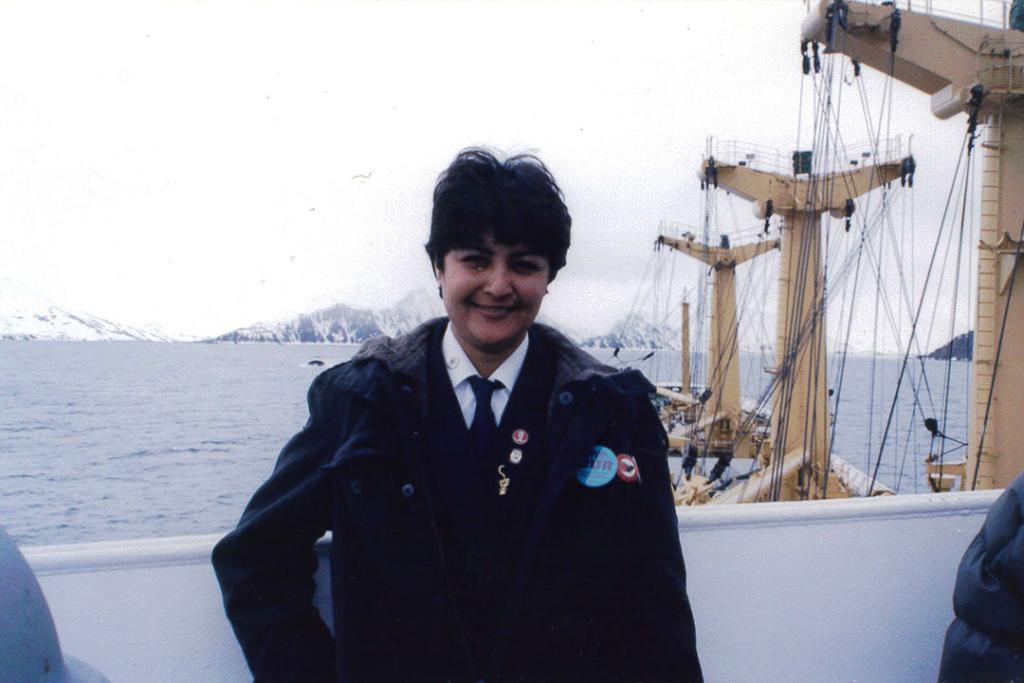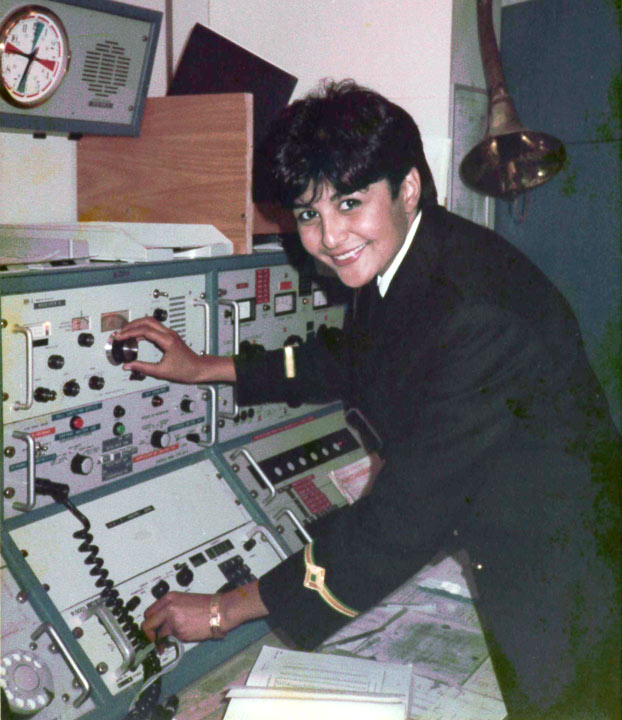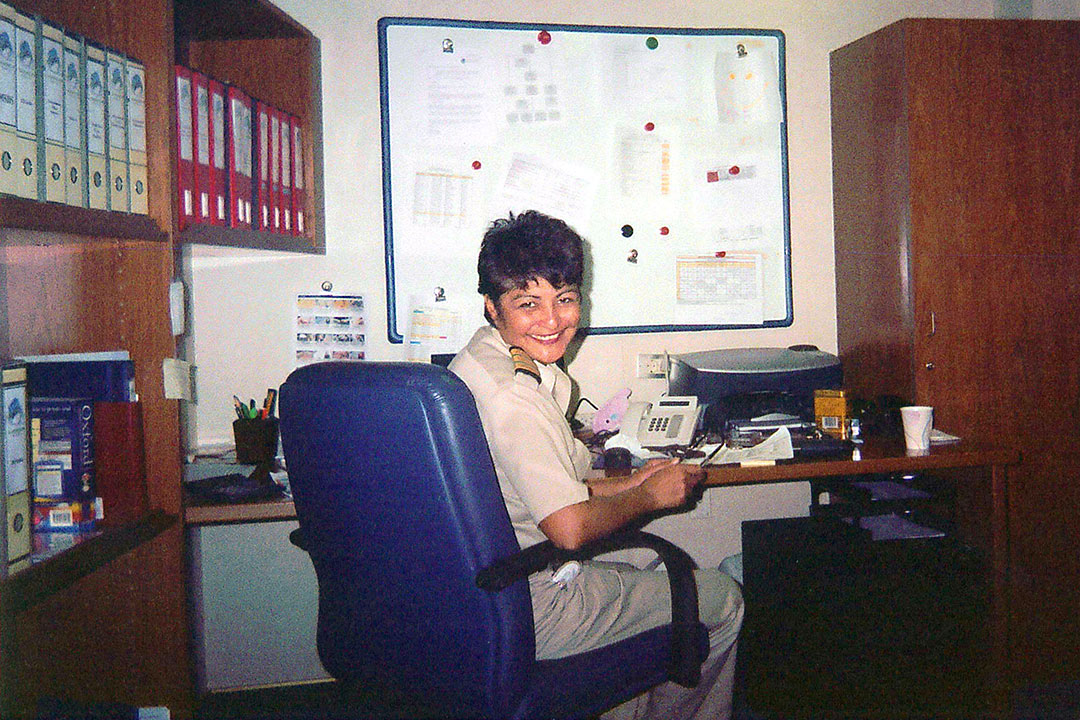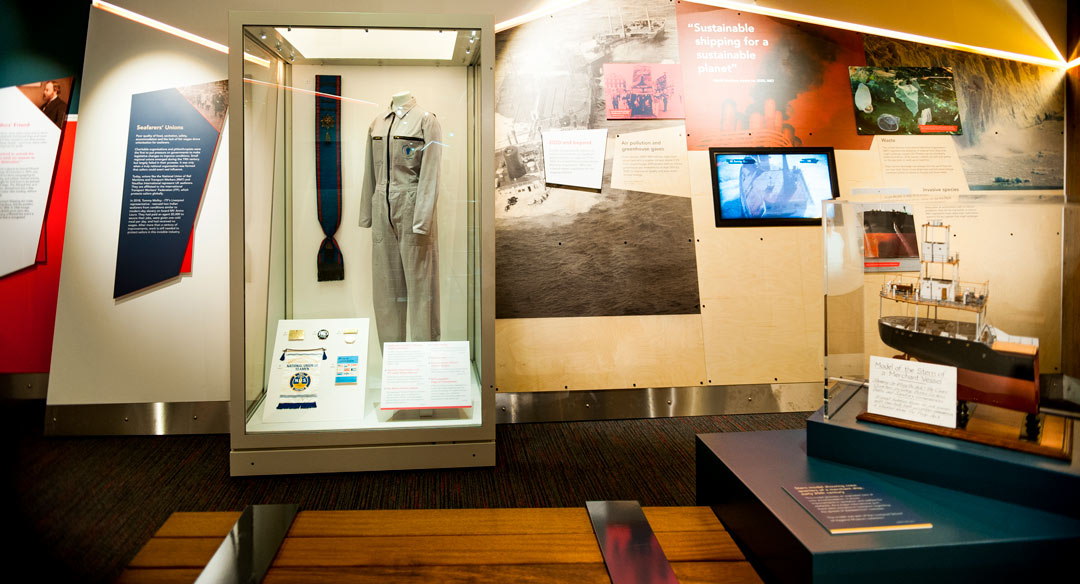Fazilette Khan - making a difference
Fazilette Khan had a long career in the Merchant Navy, first as a Radio Officer and later as an Environmental Officer. Her concern for the marine environment inspired her to found The Greenseas Trust, a charity working to reduce plastic pollution in the sea and raise awareness about the issue. Fazilette is one of the seafarers featured in the Life on Board gallery at the Maritime Museum.

I always had a wanderlust and a curious mind. My father was in the Navy which probably impacted on a subconscious level. I wanted to travel to places people dream about. To learn about different cultures, eat different foods, have different experiences and above all - actually be at sea.
I’m fortunate to have had some amazing experiences. Like watching 40 dolphins jump out of the water in synchronised formation. Or watching water spouts on the horizon sucking up the ocean like a hoover, seeing the dazzling light shows created by bioluminescence as the ship ploughed through the waves, and enduring the sensation of floating like a helpless cork during dark storms and hurricanes.
There were very few women when I first went to sea. The HR departments of companies were not too keen on having women on ships. Luckily my rank as a Radio Officer was mandatory at the time, and ships could not sail without one. So for many years I took on both full employment with a particular company or freelanced contract by contract.

I have definitely faced discrimination as a woman. Having to always prove myself every time I joined a new ship, even after years of service in my rank, used to really irk me. People have all kinds of preconceived ideas and prejudices and for a lot of reasons. My personal mantra was 'you can't win them all'. I became very good at appreciating my own self worth and would stand up for myself. I refused to be intimidated by anyone, no matter their rank, size or whatever. It made me a very confident person. As long as I was able to establish the respect I deserved for the job I was doing, the rest became unimportant. But to be honest, on many occasions I think I just ground them down. It’s difficult to bully an apparently happy-go-lucky person who refuses to be discouraged.
Technology has changed a lot during my time at sea. Some technology has made things better for the marine environment in terms of reducing the volume of some waste streams or making them less harmful. Compactors, crushers and shredders make it easier to keep waste on board till the next port. Ultra violet can be used to kill bacteria in processed sewage discharges, eliminating the use of the chemicals previously used.
It’s sad to see the marine environment so polluted with plastic debris and non-biodegradable rubbish. Islands of flotsam and jetsam in coves and inlets has become the norm in many places. The situation gets worse each year. When I first went to sea bottled water was not prevalent. Crews and passengers used to happily drink the ship's water. Now it's a different story, the multinationals have somehow brainwashed the world into thinking bottled water is best - which is so untrue.
I was inspired to get involved in environmental campaigning on my second ship. I was standing on the bridge wing of this 450000 tonne oil tanker. The ocean flat like a sheet of glass without a ripple in sight, and then a huge tractor tyre with four paint cans bobbing in its wake floated past. To my utter surprise I found there were no ships in the vicinity of us. I realised then, what you throw into the sea does not disappear, it just goes round and round.
The pivotal moment happened in 2002. I went on holiday on the island of Tobago and saw people picnicking on gorgeous beaches and they would think nothing of throwing their plastic beverage bottles, food wrappers and rubbish into the sea afterwards. Not realising the consequences of their actions on the aesthetics of the beach, their economy, in term of tourism, the fish stocks and above all, their health.

I felt I had to do something about it, even if it meant I was going to be a one-girl band! I did not want to be one of those people who bemoans a problem just wrings their hands in despair. Instead, I wanted to be someone who would give it the best shot to find a solution and implement it. I wanted to change human behaviour as a long term solution. Thankfully GreenSeas Trust, which I established in 2003, achieved these goals in Tobago and continues to do so today, in the UK.
I am very honoured to have received the Merchant Navy Medal in 2020. It was a proud moment for me to be recognised for the work I champion in terms of protecting the marine environment through GreenSeas Trust.
However the proudest moment of my career was getting my Radio ticket in the first place - the MRGC (Maritime Radio Communication General Certificate). None of my achievements would have been possible without that qualification. And it was very hard, especially since I was not a very logical person at college and engineering is a subject that requires structured thoughts for problem solving.
Seafaring is a fantastic way of seeing the world and being paid to do it. There is a camaraderie rarely found anywhere else. However, while it is the 21st century, attitudes towards women at sea have not changed drastically, one needs to be able to fight their own corner and not rely on HR to do it for them. You have to be confident in your own skin.

Gallery photograph © Mina Bihi Adjustment Bureau. All other images courtesy of Fazilette Khan
